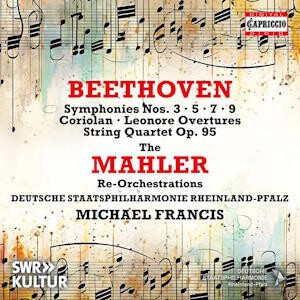Not really, but that is part of the furor generated by Wagner at the time.
We usually think of Mahler as a composer, but at the time he was a very active conductor. It is thought that some of the changes he made to the Beethoven gems were sponsored by a desire to make the playing easier for the orchestra.
So what is the result? IMHO the music in this set is brilliant and I relaxed to enjoy it, not trying to nit pick about changes Mahler made.
This is the blurb on the Cappricio site -
Whenever Gustav Mahler spoke of Beethoven, he did so with an air of reverence: "Among poets and composers of more recent times we can, perhaps, name but three: Shakespeare, Beethoven, and Wagner.” And yet, Mahler the conductor considered Beethoven’s scores primarily a challenge; material that needed adapting and adopting to the orchestras and concert halls of his time. Richard Wagner had already prepared Beethoven’s scores and written about it in great detail. The balance of sound of the classical orchestra was off, and a return to previous states was out of the question, given the increased size of the concert halls. People knew of their existence, but it was not until 1927 that Erwin Stein, the composer, pianist, and music journalist active in Schoenberg’s circles, was able to report that all of Mahler’s conductor’s scores, replete with his “Retuschen” (retouchings), had in fact survived.
And there is a good review at Beethoven: The Mahler Re-Orchestrations (Capriccio) - MusicWeb International
Bottom line - Highly recommended!
